Walter Murch
-
Editor Walter Murch on the Golden Ratio, Recreating a ’70s-era Editing Room and The Conversation
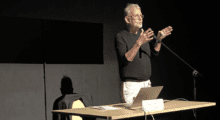
Watching a documentary on film history, editor Walter Murch was struck by how different cinematographers tended to frame faces in close-ups similarly. “I noticed something peculiar,” he said. “No matter what the film was, the eyes of performers in close-up seemed to float along the same line from shot to shot.” Murch tested his theory by tying a string of knitting yarn across his television screen. Dividing measurements from above and below the line gave him 1.618, a number that represents phi, or the golden ratio. Further measurements of faces in close-ups—from the upper frame edges to hairlines, from chins […]
by Daniel Eagan on Jan 18, 2023 -
“He’d Kill You If He Got the Chance…”: Editor Walter Murch on Coppola’s The Conversation, the Nodal Concept of Montage and Our Modern Surveillance State
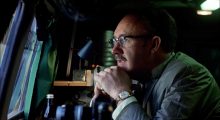
“If I really thought of the consequences all the time, I certainly wouldn’t have been in the business…” — Frank Terpil, Confessions of a Dangerous Man “Everybody has a public life, a private life, and a secret life.” — Pete Hamill There’s perhaps no greater contribution to the latter-day postmodern suspense genre than Francis Ford Coppola’s The Conversation. An exhaustive study of a lone artisan drawn into a web of deceit and treachery, it has long been held as both a prescient cinematic landmark and a seminal Ur-text. And yet fifty years after its premiere, the film is still an […]
by Evan Louison on Jan 12, 2022 -
Watch: Walter Murch Talks Music, The Conversation and “Nodal Editing”

Starting off with a discussion of classic Hollywood vs. Soviet editing styles (continuity editing vs. Soviet montage’s dialectic approach), famous editor and sound designer Walter Murch goes on to discuss a third way that he dubs “nodal editing.” Drawing examples from The Conversation, the first film he sound edited, to The Godfather to his work in documentary, Murch offers an incisive, history-laden master class in editing theory at this year’s Sheffield Doc Fest.
by Scott Macaulay on Dec 4, 2017 -
Listen: Walter Murch in Conversation (Part Two)
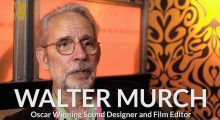
Yesterday we shared part one of a podcast conducted with Walter Murch conducted by Glenn Kiser for the Dolby Institute Conversations with Sound Artists series. In this second part, Murch discusses how Apocalypse Now changed the state of film sound, why going to film school could be a good idea, and using sound effects to express a character’s emotional state.
by Filmmaker Staff on Jan 12, 2017 -
Listen: Walter Murch in Conversation (Part One)

We’re pleased to be sharing this podcast conversation with legendary editor Walter Murch, conducted by Glenn Kiser and including questions from other leading sound designers including Randy Thom, Gary Rydstrom, and Ren Klyce, for the Dolby Institute Conversations with Sound Artists series. In this first part, he discusses documentaries’ effects on contemporary films, as well as aspects of his work on four of his most famous films: Apocalypse Now, The Conversation, The Godfather and The English Patient. We’ll post part two of the podcast tomorrow.
by Filmmaker Staff on Jan 11, 2017 -
Watch: Walter Murch’s Six Criteria While Editing
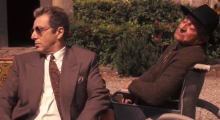
Walter Murch speaks in this video about his top six considerations while editing, from emotion and story down through the more technical considerations of keeping the audience’s eye moving. Oddly, the video (edited by Max Chatfield) begins with a lengthy montage of opening credits logos from some of the films Murch has worked on and ends with an end credits montage of same; the meat of the comments starts around the 50-second mark.
by Filmmaker Staff on Oct 26, 2016 -
“Guillermo’s Got a Wonderfully Unhealthy Obsession with Insects”: Screenwriter Matthew Robbins on Crimson Peak
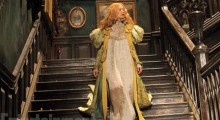
If screenwriter Matthew Robbins had penned the pivotal moments of his movie life, he might not have come up with anything better than the reality. Robbins fell in love with movies in Paris while studying abroad alongside his college roommate, future editing legend Walter Murch. After writing Steven Spielberg’s debut theatrical feature (The Sugarland Express) and directing the fondly remembered 1980s fantasy films Dragonslayer and *batteries not included, Robbins found himself in Guadalajara, Mexico as part of a program to mentor aspiring filmmakers. He was assigned a 29-year-old with a fondness for insects and ghost stories named Guillermo del Toro. […]
by Matt Mulcahey on Oct 26, 2015 -
Watch: “A Conversation. With Walter Murch”
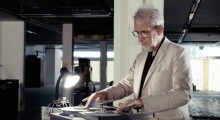
This year, the legendary Walter Murch received a “Vision Award — Nescens” from the just-completed Locarno Film Festival, and this neat short film was presumably made to accompany the presentation. Director Niccolò Castelli places Murch in a warehouse very much like Harry Caul’s setup in The Conversation. Murch plays with previously recorded analogue tape of him talking about how we’re introduced to the concept of music while in the womb, then talks about the process and history of the manipulations he just executed on the Revox. It’s a typical combination of Murch’s trademark bigger-picture thinking and acute technical knowledge.
by Vadim Rizov on Aug 17, 2015 -
The Sound of Helicopters in Apocalypse Now
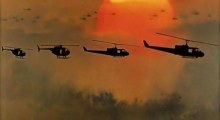
A film’s first shot, its first image, is one that’s obsessed over by many directors. But how many put as much care into its first sound? Francis Ford Coppola did, along with sound designer Walter Murch, when constructing the opening of Apocalypse Now. The famous helicopter sounds actually enter over black — they are the first input of any kind an audience member receives. And, of course, those weren’t just any helicopter sounds. In the video above — a section of a documentary commissioned for the Paramount 2006 home video release and made by Zoetrope’s former head of post, Kim […]
by Scott Macaulay on Nov 30, 2014 -
Watch: Walter Murch Talks Editing with Jon Favreau
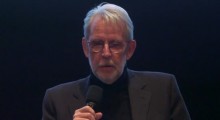
“Cutting is not just something that we have to do because of the discontinuous nature of the way we shoot films,” Walter Murch muses in this clip from a recent conversation with Iron Man/Chef director Jon Favreau. “We actually, both as filmmakers and as audiences, like these sudden juxtapositions of concepts.” Editing, of course, is Murch’s beat — his livelihood and the subject of multiple books he’s both written and been interviewed for. A little overlap with past comments is to be expected, and his thoughts about understanding editing as what happens when you blink and your eye moves from […]
by Vadim Rizov on Aug 1, 2014
